April 23, 2014 | Posted in FANDOM | By sockii
Building a Niche Interest Wiki
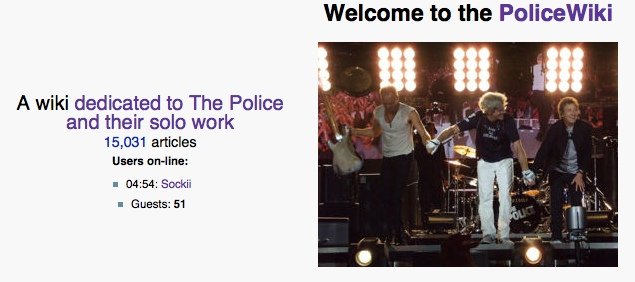
Screencap of a portion of the front page of The PoliceWiki, a MediaWiki-based website dedicated to the rock band The Police.
We are all surely familiar with Wikipedia today – the user-edited online encyclopedia that we often turn to for facts, trivia, and all kinds of information we may search for. But Wikipedia is far from the only “wiki” online today, and there are many reasons why you might wish to create your very own wiki dedicated to a particular niche interest, fandom or any topic that you like.
A wiki, in essence, is a website that users can add to, edit, and even delete information from via a web-browser interface. It’s perfect for building a depository of information related to specific topics – particularly those that might be considered too specialized to meet Wikipedia’s “notability” requirements! For instance, you can make a wiki all about your favorite television series, musician or band, a hobby or location…even a wiki all about you! Building a wiki can also be a good school project for a classroom environment, as it can teach students a lot about information organization, cooperative work, proper referencing and copyright, and much more.
I currently maintain a wiki dedicated to the rock band The Police, called The PoliceWiki. I also used to contribute regularly to a large fandom wiki (FanHistory), which is where I first learned about wiki editing and management. I’ve created this page to help provide resources and information to others who might be looking at creating their own wiki – or maybe aren’t sure what a wiki could do for them. I’ll talk about where you can host your wiki, what wiki platforms and software is available, and also things to consider when planning out your wiki and how you will present its content.
Just What IS A Wiki, Anyway?
A quick introduction
Put simply by Ward Cunningham, author of the first wiki software WikiWikiWeb, a wiki is “The simplest online database that could possibly work.”
A wiki is a piece of server software that allows users to freely create and edit web page content using any web browser. Wiki supports hyperlinks (internal and external) and has a simple text syntax for creating new pages and crosslinks between internal pages, completely on the fly. Wiki language is similar to html and bbcode, so anyone reasonably familiar with coding or posting in such formats should be able to learn to write for a wiki with minimal training and new knowledge required.
Wiki is somewhat unusual among group communication mechanisms, in that it allows the organization of contributions to be edited in addition to the content itself. That is, you can continually add new categories, move pages around, and re-categorize them as your work progresses on the site. So while having an initial “road map” for your wiki is very helpful, if you find you need to modify it later as new information is acquired it is quite possible to do so without rewriting the page/website from scratch.
Wikis can be very useful in fandoms, niche topic communities, and other special interest groups as a way for members of the community to share their knowledge, resources, and their creations. Instead of one person or group being responsible for keeping a website maintained, a wiki allows all users to contribute and maintain the site. This group knowledge and experience can lead to a site with much richer content overall, and for most contributors, minimal knowledge of the editing syntax is required. For the hosts and creators of a wiki, however, a little more work is involved, which will be discussed below.
A Few Sample Wikis
Exploring the variety of wikis on the net currently
- The PoliceWiki: As mentioned above, The PoliceWiki is a wiki I maintain dedicated to the rock band The Police. We cover everything from recording discographies to memorabilia, published articles about the bandmembers, and a detailed day-by-day chronology of band (and solo artist) activity. The goal of the PoliceWiki is to be THE best fan resource on the internet, and we are fortunate to have received tremendous support from individuals associated with the band, photographers, and even Stewart Copeland who allowed a Wiki representative access to his personal diaries to record timeline information – from the source himself!
- Wookiepedia: Wookiepedia is a large wiki devoted to all things Star Wars: the films, the books, the collectibles…everything!
- Fanlore: Fanlore is a wiki devoted to fandom culture and fanworks, largely Western media fandom as developed around particular tv series, films and related media.
- Oh Internet: Formerly the “Encyclopedia Dramatica”, Oh Internet is a wiki of, well…internet memes, trolls, wanks and general satire of current events on the internet.
- Supernatural Wiki: A wiki devoted to the popular cult tv series “Supernatural”.
- WikiFur:A wiki dedicated to furry fandom, culture and community.
- Geek Feminism Wiki: A resource for and about women in geek communities.
Some Basic Wiki Terminology
Terms and phrases you’ll hear when “talking wiki”
Administrators (sys-ops): Wiki administrators are individuals who have extra powers on a wiki – for instance, to lock pages so they cannot be changed by other users, to block IP addresses or accounts which are spamming or vandalizing a wiki, to approve new users for the site and to have access to access special pages and features on the wiki. Admins also typically are the ones to vote and discuss any matters of controversy or debate that may arise over wiki content.
Categories: How individual pages within a wiki are organized. Categories can be added to, changed, and pages put in multiple categories – but they are vitally important as the key way users find content. Think of categories as the branches of the wiki tree, with individual pages their leaves. Uncategorized pages on a wiki can be nearly impossible to find unless a user types in a search phrase for it precisely.
History: Every wiki page maintains a page “history“, where all previous changes and additions to a page can be viewed. This is useful in cases on vandalism to track and “rollback” a page, or if an edit has come under debate or needs to be removed.
Recent changes: A page listing all edits made to the wiki within a recent timeframe. The Recent Changes page is most useful to admins who may wish to monitor what editing activity has taken place on the wiki.
Skin: The visual appearance of a wiki’s pages. Many skins are pre-existing and easily added to a site, and can be edited as well to change colors/fonts/layout/etc.
Special pages: Pages useful to administrators, such as user lists, uncategorized pages, uncategorized categories, uncategorized images, “wanted” pages, and wanted categories.
Talk pages: Every page on a wiki has a discussion or “Talk” page, where content of the page can be discussed. For instance, if there is controversy over a page’s content or edits, the talk page can be used to argue the facts and/or whether to leave the content there or not.
Templates: Templates are useful in keeping wiki pages consistent in appearance and information contained. For instance, on a music-related wiki you might want templates for information on albums and songs, recording artists, and performances. (For instance, check out the index of available article templates on The PoliceWiki.)
Steps in Creating a Wiki
Thinking about building a wiki now? Here are the basic steps and questions to ask yourself.
Wiki Creation Step #1: Define your purpose and goals
Before you begin creating a new wiki, you need to ask yourself the following questions:
1. Will your wiki be…
- A factual guide to a fandom/band/special interest/hobby/etc?
- An archive of creative works (fiction, art, poetry, articles, opinion pieces)?
- A database or index of information on a specific individual, location, subculture or event?
2. What range of information will your wiki cover?
- If your wiki is about, say, a television series, will you cover only the “canon” events of the show? The actors and their careers outside of the show? Fannish activities and works such as fan pages and fanfiction?
3. What information related to your subject won’t it cover?
- For a wiki about individuals or celebrities, you may need to set guidelines about gossip/personal information vs. public information
- Facts versus opinions and speculation
4. What sourcing/notability/reference requirements will your wiki have?
- Remember that a wiki is almost always a secondary source – so you may want to be clear about what references and referencing system you will require for information added by individuals who did not experience things first-hand.
5. Is there another wiki on your subject already?
- Not sure? Check WikiIndex to find out. If there is already an existing wiki on the subject, ask yourself how yours will be different. Find out if it would be better to incorporate your efforts into an existing wiki versus starting an entirely new one from scratch.
6. Can you write a mission statement to explain your wiki’s goals and purposes?
- This is good to post on or at least link to from your wiki’s main page. That way visitors – and potential contributors – have a clear sense of what your wiki’s purpose is. From the main page of ThePoliceWiki, we put out our mission statement as follows (in part):
“The goal of the PoliceWiki is for fans of The Police, Andy Summers, Stewart Copeland and Sting (and Henry Padovani too!) to have a place to document the band’s history and fandom in a format that is open to everyone’s contributions of knowledge, reference materials and experiences.
Why a wiki? There is already a wealth of Police and related information on the internet that has been assembled and generated by dedicated, hardworking fans for many years. But the difficulty is that this information on the band — its history, its members, their accomplishments both as a band and in their solo careers — is spread all over the place. There’s a timeline of events over here; a discography over there; a list of solo efforts on one site for one band member and elsewhere for another. There is also useful information scattered throughout decades of magazine articles and interviews easily lost track of through time and through websites disappearing.
With the PoliceWiki, we wish to make it possible to locate such information quickly and easily. We want to serve as a quick reference site where various types of information relevant to the band can be brought together into a single repository, and to make it so that information can be easily expanded upon, corrected or added by anyone who has details to share.”
Wiki Creation Step #2: Gather your initial staff and volunteers
Don’t try to do it all on your own (unless it’s a very small wiki!)
Once you’ve decided on going ahead with a Wiki, you need to gather your starting support staff and volunteers (unless they’ve been with you since the start of the project, which may also be the case!) Ideally you should have a least a few other people with you willing to take on administrative duties – preferably with some Wiki editing and maintenance experience in the past and of course, a familiarity with the subject matter.
When I started working on The PoliceWiki project, I was the only one of our three primary admins who was experienced with a Wiki. One other, however, was experienced with information architecture and organization; the other was a very dedicated fan who was eager to learn and offer his opinions on logical structure for the site. I also had a good friend who was running a different wiki and had been for years, so even though she was not involved in Police fandom she was willing to help out with my technical questions about running wiki software, setting up proper disclaimers and admin policies, and answer other questions I had at the start.
If you are looking to undertake a very large wiki project, or one with some specialized needs, you may need to hire even short-term a programmer experienced in wiki management to help you get started.
Keep in mind, not everyone who joins a project at first will stay with it in the long run. Some people may be enthusiastic at first but then lose interest. Others may get too busy with “real life” jobs and other commitments. Some may have important roles to play at first, when the wiki is just getting organized, but not have a lot to contribute later on. If you find yourself getting short-handed with help, reach out to recruit new administrators and volunteers as need be.
Wiki Creation Step #3: Decide on hosting and wiki platform
There are several different options available to you
First you need to decide on which wiki software platform you wish to use. The primary two today are MediaWiki and WetPaint. (I use MediaWiki.) MediaWiki is a free open-source software package written in PHP, and is the one originally used for Wikipedia. WetPaint is an alternative, for those who wish a more “click-and-type” type interface for their wiki (minimal if any programming required or necessary to begin).
If you decide to use MediaWiki, then you need to choose your site hosting option. The simplest is to set up your Wiki on Wikia, a hosting service for wikis only. You can start a wiki for free on Wikia, and there are some advantages to the site. Wikia has an already established userbase, good internet traffic, a support staff, and is free for most users. However, one must be willing to put up with advertising on the site and there is some restriction of functionality and allowable wiki extensions. Additionally, there can be questions about the copyright and ownership of content on Wikia; Wikia is not free of controversy including surrounding trying to acquire and “buy out” wikis hosted elsewhere.
If you decide to host the wiki yourself, then you have more flexibility – however potentially more expense as well. If your wiki is small and not likely to get tremendous daily traffic, you may be fine using a shared hosting service. I host the PoliceWiki on Dreamhost, as just one of many other domains and sites I run for a nominal ($10/month) charge. Dreamhost also offers “one-click install” of MediaWiki on any domain you host there, which makes it very easy to get a wiki up and running; you’ll need to do very little fussing with the coding yourself unless you start adding lots of extensions.
If your wiki becomes quite large and/or popular, you might need to switch to more expensive hosting like a virtual or dedicated server. However, unless your wiki is likely to have hundreds of thousands of pages and get thousands of visitors a day, this is not something you need to worry about – at least not right away!
Wiki Creation Step #4: Work on a Site Map
It’s important to plan your wiki architecture before jumping in
While wikis are such that you can revise the category structure as you go, that can be a real pain once you’ve already got several hundred or thousand pages in place – and realize that you need to change everything. So now is good time to start mapping out a game plan for your site’s architecture and category structure. This will be quite dependent on the subject of your wiki; you can view the PoliceWiki Site Map to see how we eventually decided on our primary site category structure.
Our Site Map may look relatively simple now, but in fact it took several month’s work among our three admins to determine on this approach. Often there may not be a single, obvious way to organize categories, but you want to ask yourself these questions:
- What will your main categories be?
- How will they interconnect or overlap with each other?
- Will this wiki structure make sense to a browsing visitor? (That is, will they be able to navigate through the site to find the information they are looking for?)
- How will you handle naming conventions? Dates and years? Venues which may change names through the years?
A flowchart program can be useful while trying to work on the category structure. It can also be handy to start creating blank “stub pages” (or placeholders) for content you know you will want to include on your wiki. As you create these stubs, you will likely start to come across issues in categorization that might not have been obvious until you started trying to put information in place.
Wiki Creation Step #5: Build Page Templates
Templates help make it easier to build new pages
Templates are important on a wiki, so that pages have a consistent look and style. Templates also make it easier for new users to understand how to add information to a wiki; they see where there may be blank “spaces” in the requested information and can jump in quickly to add it.The best way to go about building templates is to look at templates already in place on other wikis! Examine their coding by choosing “view source”. Work from there in adapting and building the template coding as you wish, and create a category on your wiki for all templates which will be available to choose from. On The PoliceWiki we have a Help page listing all available templates; you might wish to browse through these examples to get a sense of how templates can be structured.
Note: It’s also a good idea to lock/protect your template pages once complete! That way they cannot be accidentally edited by others, but their source can still be viewed and copied as needed.
Wiki Creation Step #6: Determine your wiki copyright
Also, how will your wiki approach copyrighted materials?
You should also set a Copyright Policy for your wiki content; if you check Wikipedia (and the PoliceWiki), you can see it is common to operate a wiki under a Creative Commons license for text, with the caveat that additional terms and copyright may apply to other content such as image media.For instance, with a wiki about a band such as The Police, obviously we would be making reference to album covers, artwork, books and magazines about the band, and other such items which are clearly under copyright but which we feel can be justified under fair use. (The PoliceWiki is a not-for-profit website.) We use image templates similar to Wikipedia which allow users to specify the copyright of the image uploaded. Beyond mass-produced images such as album art and posters, we only allow photos of the band, related artists and venues when approval has been granted by the photographer him or herself, and copyright is clearly indicated.
Wiki Creation Step #7: Finally launching your wiki to the public
Promotion and taking care of spam and vandalism
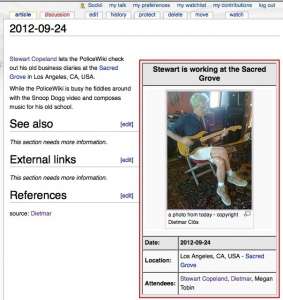
One of my favorite days in PoliceWiki “history” – September 24, 2012, when Stewart Copeland let one of our wiki admins visit and collect data and facts from his old Police business diaries!
Once you’ve got everything in place, and hopefully at least built some basic content so that others can see how you plan to keep building and expanding the Wiki, it’s time to announce it to the public! You want to make sure other people with similar interests, and people who might be able to contribute useful information to your Wiki, know how to find it.
Obviously any communities, forums, message boards and mailing lists related to your Wiki are a good place to promote it. Just be courteous and don’t spam! Be ready to answer any questions about your chosen site structure, covered topics, and any notability requirements you may have put in place. Also be ready to help guide others who may be hesitant about contributing, if they are not familiar with Wiki editing. From my experience there may be a lot of resistance to jumping in and editing at first, or mistakes made in formatting by those who don’t understand wiki markup language well (keeping a close daily eye on your site’s Recent Changes page is a good idea.)
You’ll also have to keep an eye out for spam and vandalism attacks on your Wiki – unfortunately by allowing “anyone to edit”, you may find your site vulnerable to spam and even hacking attacks. You can choose to set your wiki such that only logged in, approved members can edit it – this is eventually what we had to do with the PoliceWiki after it was becoming a daily hassle to clean up spam. It was also more feasible for us since there is today are only a few individuals regularly contributing, and receiving content submissions directly to them.
Beyond that, be sure to follow a regular back-up schedule for your wiki, especially if you allow open/anonymous editing. You do not want to lose months or even years of hard work to a hacker attack, or server crash! Most wiki hosting platforms make it easy to do backups of your databases; then you should make sure to back up separate folders such as image archives and wiki extensions as well.
Related posts at Spacial Anomaly
Table of Contents
- Building a Niche Interest Wiki
- Just What IS A Wiki, Anyway?
- A Few Sample Wikis
- Some Basic Wiki Terminology
- Steps in Creating a Wiki
- Wiki Creation Step #1: Define your purpose and goals
- Wiki Creation Step #2: Gather your initial staff and volunteers
- Wiki Creation Step #3: Decide on hosting and wiki platform
- Wiki Creation Step #4: Work on a Site Map
- Wiki Creation Step #5: Build Page Templates
- Wiki Creation Step #6: Determine your wiki copyright
- Wiki Creation Step #7: Finally launching your wiki to the public
sockii
sockii is just your typical Jane-of-All-Trades who never has enough time in her day for all of her projects. She has written for many websites online including Squidoo, Zujava, Yahoo! Contributors Network, HubPages and Wizzley. She has been attending and vending at science fiction and media conventions for over 15 years, and for several years ran an art gallery and jewelry store in Philadelphia. Today she is happy to be living in South Jersey with her partner David and their 6 cats. Sockii is a member of several affiliate sales programs including Amazon Associates and Viglink. Products from these services may be advertised on her posts and pages to generate sales commissions.
2 Comments
Leave a Reply
*
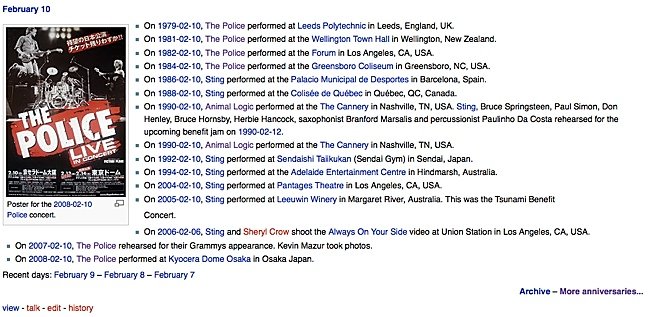
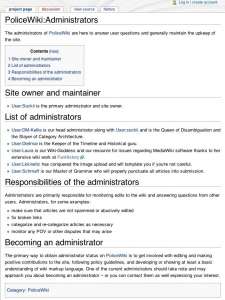
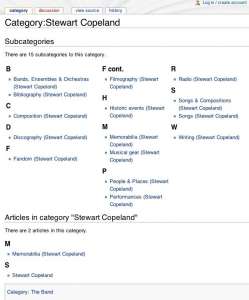














writerjoanne
April 24, 2014
Very interesting. I was unaware of this until now. This is something I might look into some time.
sockii
April 24, 2014
It’s a big project to take on setting up a wiki, but it can be very useful for people and a great way to create a collaborative resource for people. We’ve gotten a lot of contributions to the PoliceWiki from people who worked with the band, even band members themselves at this point! Of course it’s a neverending undertaking as well…one more project I never have enough time to devote to, alas…